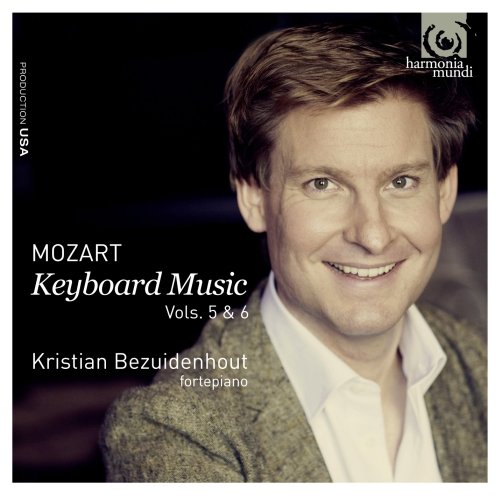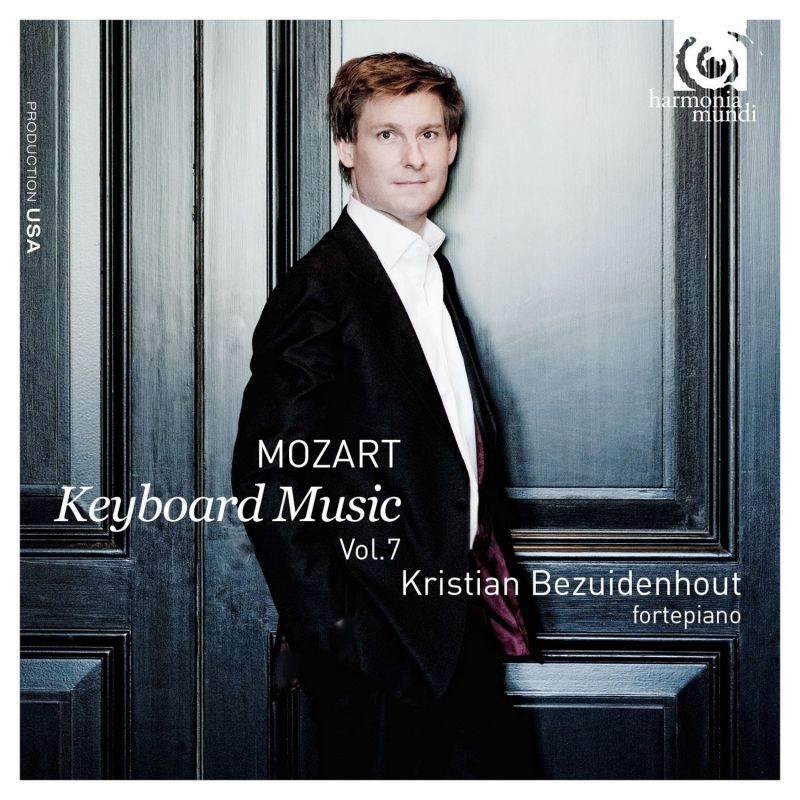MOZART Keyboard Music Vols 5, 6 & 7
View record and artist detailsRecord and Artist Details
Composer or Director: Wolfgang Amadeus Mozart
Genre:
Instrumental
Label: Harmonia Mundi
Magazine Review Date: 02/2015
Media Format: CD or Download
Media Runtime: 141
Mastering:
DDD
Catalogue Number: HMU90 7529/30

Tracks:
| Composition | Artist Credit |
|---|---|
| Sonata for Piano No. 11 |
Wolfgang Amadeus Mozart, Composer
Kristian Bezuidenhout, Fortepiano Wolfgang Amadeus Mozart, Composer |
| (6) Variations on 'Salve tu, Domine' by Paisiello |
Wolfgang Amadeus Mozart, Composer
Kristian Bezuidenhout, Fortepiano Wolfgang Amadeus Mozart, Composer |
| Romanze |
Wolfgang Amadeus Mozart, Composer
Kristian Bezuidenhout, Fortepiano Wolfgang Amadeus Mozart, Composer |
| (12) Variations on an allegretto |
Wolfgang Amadeus Mozart, Composer
Kristian Bezuidenhout, Fortepiano Wolfgang Amadeus Mozart, Composer |
| Sonata for Piano No. 7 |
Wolfgang Amadeus Mozart, Composer
Kristian Bezuidenhout, Fortepiano Wolfgang Amadeus Mozart, Composer |
| (12) Variations on 'Ah, vous dirai-je, Maman' |
Wolfgang Amadeus Mozart, Composer
Kristian Bezuidenhout, Fortepiano Wolfgang Amadeus Mozart, Composer |
| Sonata for Piano No. 4 |
Wolfgang Amadeus Mozart, Composer
Kristian Bezuidenhout, Fortepiano Wolfgang Amadeus Mozart, Composer |
| Sonata for Piano No. 3 |
Wolfgang Amadeus Mozart, Composer
Kristian Bezuidenhout, Fortepiano Wolfgang Amadeus Mozart, Composer |
| (12) Variations on 'La belle Françoise' |
Wolfgang Amadeus Mozart, Composer
Kristian Bezuidenhout, Fortepiano Wolfgang Amadeus Mozart, Composer |
| Adagio |
Wolfgang Amadeus Mozart, Composer
Kristian Bezuidenhout, Fortepiano Wolfgang Amadeus Mozart, Composer |
Composer or Director: Wolfgang Amadeus Mozart
Genre:
Instrumental
Label: Harmonia Mundi
Magazine Review Date: 02/2015
Media Format: CD or Download
Media Runtime: 73
Mastering:
DDD
Catalogue Number: HMC90 7531

Tracks:
| Composition | Artist Credit |
|---|---|
| Sonata for Piano No. 6 |
Wolfgang Amadeus Mozart, Composer
Kristian Bezuidenhout, Piano Wolfgang Amadeus Mozart, Composer |
| Sonata for Piano No. 8 |
Wolfgang Amadeus Mozart, Composer
Kristian Bezuidenhout, Piano Wolfgang Amadeus Mozart, Composer |
| (6) Variations in G on 'Mio caro Adone' by Salieri |
Wolfgang Amadeus Mozart, Composer
Kristian Bezuidenhout, Piano Wolfgang Amadeus Mozart, Composer |
| (9) Variations on 'Lison dormait' from Dezède's |
Wolfgang Amadeus Mozart, Composer
Kristian Bezuidenhout, Piano Wolfgang Amadeus Mozart, Composer |
Author: David Patrick Stearns
Bezuidenhout seems to piggyback lesser works (variations) on to major ones (sonatas) by juxtaposing them together, paired according to similar chronology, revealing moments of synchronicity as well as dramatic leaps in Mozart’s evolution, such as on Vol 7 when the 1773 Six Variations on ‘Mio caro Adone’ in G major, K180, are followed, in 1774, by the gargantuan theme-and-variations final movement of the Piano Sonata in D major, K284, showing Mozart working with an invention and rigour that almost sound like another composer. Elsewhere, though, Mozart’s freewheeling variations, at least in these performances, are doorways into the composer’s psyche in ways that the more formal, polished sonatas are not. The variations were like Mozart’s secret garden, offering glimpses of his improvisatory spirit. Dare I say that Beethoven’s Diabelli Variations came to mind repeatedly in these three volumes?
‘When Mozart played a simple scale,’ wrote Wanda Landowska, quoting the composer’s contemporaries, ‘it became transformed into a cavatina.’ That sums up the Bezuidenhout difference. His typical Mozartian attributes include firm command of structure, great instincts for sympathetic tempi and a technique refined enough to get at the tiniest details – in contrast to Paul Badura-Skoda’s more forceful but generalised fortepiano sonorities (Gramola). More distinctively, Bezuidenhout’s elastic tempi give him room to probe for meaning but also allow panache that’s so much a part of Mozart’s buoyant temperament and prompts some delightfully elongated final cadences. Not only does one hear the notes with more transparency than on a modern instrument but one also gets a stronger sense of Mozart’s larger world. Bezuidenhout’s stealth weapon, though, may be the unequal temperament of his copy of an 1805 Anton Walter instrument. The popular notion that equal temperament reigned exclusively after JS Bach just isn’t true. Experiments with alternative tuning – I’m thinking of Peter Serkin playing late Beethoven – can be colouristic revelations, which is also true of Bezuidenhout. So if you can only afford one volume of this series, which would it be? I refuse to say. Hear them all.
Discover the world's largest classical music catalogue with Presto Music.

Gramophone Digital Club
- Digital Edition
- Digital Archive
- Reviews Database
- Full website access
From £8.75 / month
Subscribe
Gramophone Full Club
- Print Edition
- Digital Edition
- Digital Archive
- Reviews Database
- Full website access
From £11.00 / month
Subscribe
If you are a library, university or other organisation that would be interested in an institutional subscription to Gramophone please click here for further information.




